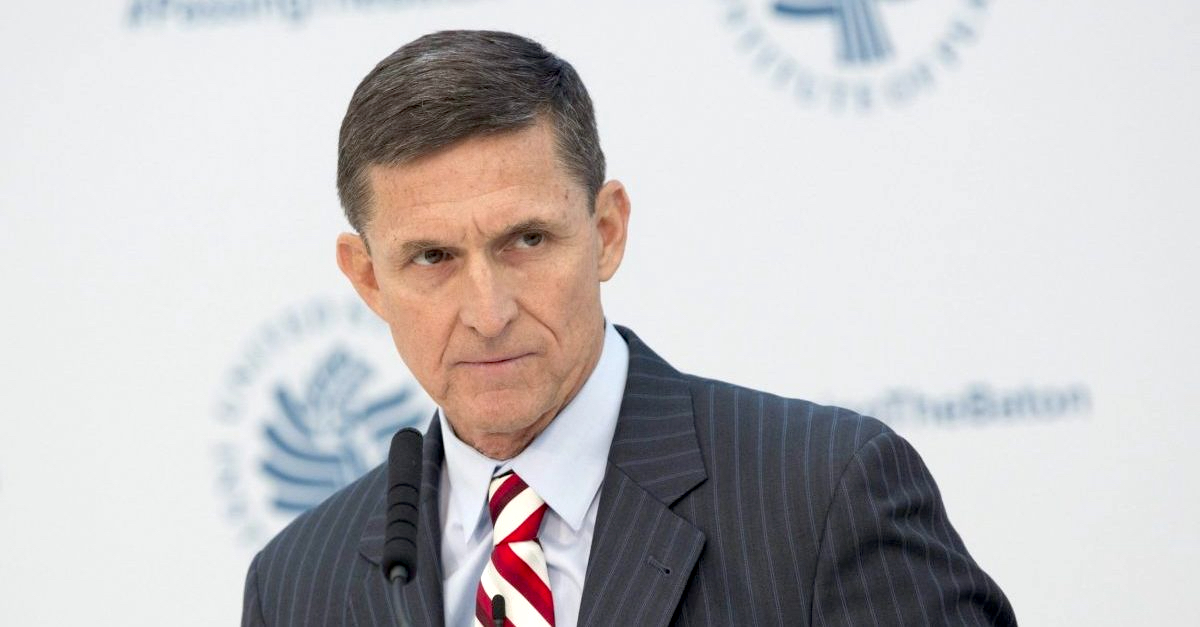
Michael Flynn appears in a file photo speaking at a conference in Washington, D.C., on January 10, 2017. (CHRIS KLEPONIS/AFP via Getty Images.)
The federal judge in Florida has thrown out a million lawsuit brought by ex-U.S. National Security Advisor Michael Flynn. Flynn had sued the federal government, alleging that he had been unfairly prosecuted for providing false information to the FBI regarding his discussions with Russian government representatives.
Flynn in 2017 pleaded guilty to to one felony count of “willfully and knowingly making materially false statements and omissions to the Federal Bureau of Investigation” regarding conversations he had with Sergey Kislyak, the Russian ambassador to the United States.
He was pardoned by Donald Trump in November 2020.
Flynn filed the lawsuit in 2023, claiming he was the victim of “malicious prosecution and gross abuse of process” and sought “accountability and damages against the United States for these wrongs committed against General Flynn through its agents and agencies.”
“He was falsely branded as a traitor to his country, lost at least tens of millions of dollars of business opportunities and future lifetime earning potential, was maliciously prosecuted and spent substantial monies in his own defense, and has suffered and will continue to suffer mental and emotional pain for the rest of his life,” the suit stated.
U.S. District Judge Mary S. Scriven, an appointee of George W. Bush, issued a 20-page ruling on Tuesday, reasoning that Flynn failed to establish essential elements of Flynn’s malicious prosecution and abuse of process claims.
In his lawsuit, Flynn claimed that FBI agents and prosecutors working for special counsel Robert Mueller specifically targeted him “as part of the ‘insurance policy’ to derail and discredit then-presidential candidate Donald J. Trump.” Flynn additionally claimed that his guilty plea was the result of coercion by the special counsel’s office, asserting that prosecutors told him they would go after his son if he failed to enter into the agreement.
Flynn claimed that the FBI told the special counsel’s office that there “was no evidence” that Flynn had committed a crime. Special counsel prosecutors “completely dismissed” the FBI’s assessment and continued to investigate Flynn “despite knowing there was no evidence of a crime,” according to the lawsuit.
Regarding the malicious prosecution claim, Scriven reasoned that because DOJ prosecutors “do not qualify as investigative or law enforcement officers” under the controlling law, Flynn was required to show that the FBI exerted pressure or influence over the special counsel’s decision to prosecute him, something he explicitly failed to do.
“Plaintiff does not allege any FBI agent or employee attempted to mislead or influence the [special counsel’s office] by making false statements,” Scriven wrote. “To the contrary, Plaintiff goes out of his way to exonerate Barnett, an agent of the FBI, as being involved in the decision to push forward to investigate and prosecute him. Indeed, Plaintiff makes no allegations about any acts or omissions by FBI agents occurring once the [special counsel’s office] assumed responsibility for the investigation.”
Regarding the abuse of process claim, the court explained that the “usual case of abuse of process is one of some form of extortion” which requires the defendant showing “an improper use of the judicial machinery.”
“Plaintiff does not allege facts to show that any FBI agents used the judicial machinery to obtain a result other than such as would be proper in the regular prosecution of the charge,” Scriven wrote.
She also found that Flynn’s claims about being coerced into taking a plea agreement could not withstand judicial scrutiny.
“Additionally, although Plaintiff alleges he was coerced into entering a plea agreement under the threat that his son would be prosecuted if he did not cooperate, as noted, Plaintiff alleges the SCO made these threats,” the judge wrote. “Actions by SCO agents are not actionable because the United States is entitled to sovereign immunity for claims based on actions by the SCO. Thus, even if these allegations were true, which the court need not determine for these purposes, the allegations do state an actionable claim.”







